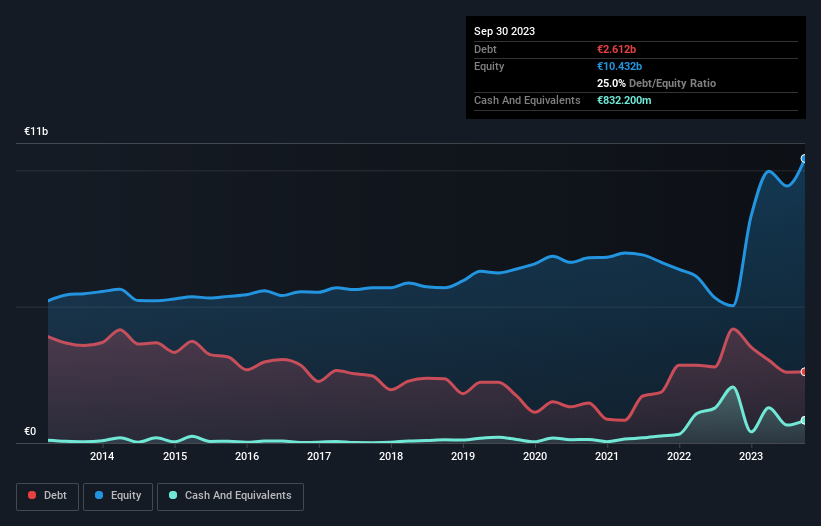Stock Analysis
- Austria
- /
- Electric Utilities
- /
- WBAG:VER
Does VERBUND (VIE:VER) Have A Healthy Balance Sheet?

Some say volatility, rather than debt, is the best way to think about risk as an investor, but Warren Buffett famously said that 'Volatility is far from synonymous with risk.' So it might be obvious that you need to consider debt, when you think about how risky any given stock is, because too much debt can sink a company. We note that VERBUND AG (VIE:VER) does have debt on its balance sheet. But the real question is whether this debt is making the company risky.
When Is Debt Dangerous?
Debt and other liabilities become risky for a business when it cannot easily fulfill those obligations, either with free cash flow or by raising capital at an attractive price. Ultimately, if the company can't fulfill its legal obligations to repay debt, shareholders could walk away with nothing. However, a more usual (but still expensive) situation is where a company must dilute shareholders at a cheap share price simply to get debt under control. Of course, plenty of companies use debt to fund growth, without any negative consequences. When we examine debt levels, we first consider both cash and debt levels, together.
See our latest analysis for VERBUND
What Is VERBUND's Debt?
You can click the graphic below for the historical numbers, but it shows that VERBUND had €2.61b of debt in September 2023, down from €4.18b, one year before. However, it does have €832.2m in cash offsetting this, leading to net debt of about €1.78b.

A Look At VERBUND's Liabilities
The latest balance sheet data shows that VERBUND had liabilities of €2.97b due within a year, and liabilities of €5.89b falling due after that. Offsetting these obligations, it had cash of €832.2m as well as receivables valued at €1.52b due within 12 months. So its liabilities total €6.51b more than the combination of its cash and short-term receivables.
VERBUND has a very large market capitalization of €29.6b, so it could very likely raise cash to ameliorate its balance sheet, if the need arose. But it's clear that we should definitely closely examine whether it can manage its debt without dilution.
We use two main ratios to inform us about debt levels relative to earnings. The first is net debt divided by earnings before interest, tax, depreciation, and amortization (EBITDA), while the second is how many times its earnings before interest and tax (EBIT) covers its interest expense (or its interest cover, for short). Thus we consider debt relative to earnings both with and without depreciation and amortization expenses.
VERBUND's net debt is only 0.37 times its EBITDA. And its EBIT covers its interest expense a whopping 56.9 times over. So we're pretty relaxed about its super-conservative use of debt. Better yet, VERBUND grew its EBIT by 124% last year, which is an impressive improvement. That boost will make it even easier to pay down debt going forward. When analysing debt levels, the balance sheet is the obvious place to start. But ultimately the future profitability of the business will decide if VERBUND can strengthen its balance sheet over time. So if you're focused on the future you can check out this free report showing analyst profit forecasts.
Finally, a business needs free cash flow to pay off debt; accounting profits just don't cut it. So it's worth checking how much of that EBIT is backed by free cash flow. Looking at the most recent three years, VERBUND recorded free cash flow of 47% of its EBIT, which is weaker than we'd expect. That weak cash conversion makes it more difficult to handle indebtedness.
Our View
Happily, VERBUND's impressive interest cover implies it has the upper hand on its debt. And that's just the beginning of the good news since its EBIT growth rate is also very heartening. We would also note that Electric Utilities industry companies like VERBUND commonly do use debt without problems. Looking at the bigger picture, we think VERBUND's use of debt seems quite reasonable and we're not concerned about it. After all, sensible leverage can boost returns on equity. When analysing debt levels, the balance sheet is the obvious place to start. However, not all investment risk resides within the balance sheet - far from it. We've identified 2 warning signs with VERBUND (at least 1 which is significant) , and understanding them should be part of your investment process.
If, after all that, you're more interested in a fast growing company with a rock-solid balance sheet, then check out our list of net cash growth stocks without delay.
Valuation is complex, but we're helping make it simple.
Find out whether VERBUND is potentially over or undervalued by checking out our comprehensive analysis, which includes fair value estimates, risks and warnings, dividends, insider transactions and financial health.
View the Free AnalysisHave feedback on this article? Concerned about the content? Get in touch with us directly. Alternatively, email editorial-team (at) simplywallst.com.
This article by Simply Wall St is general in nature. We provide commentary based on historical data and analyst forecasts only using an unbiased methodology and our articles are not intended to be financial advice. It does not constitute a recommendation to buy or sell any stock, and does not take account of your objectives, or your financial situation. We aim to bring you long-term focused analysis driven by fundamental data. Note that our analysis may not factor in the latest price-sensitive company announcements or qualitative material. Simply Wall St has no position in any stocks mentioned.

Simply Wall St
About WBAG:VER
VERBUND
VERBUND AG, together with its subsidiaries, generates, trades, and sells electricity to energy exchange markets, traders, electric utilities and industrial companies, and households and commercial customers.
Solid track record with excellent balance sheet and pays a dividend.
